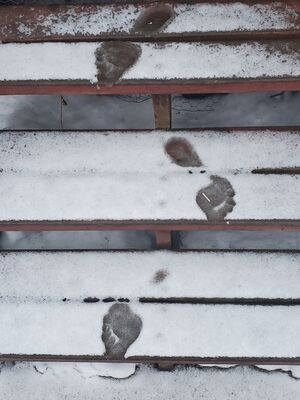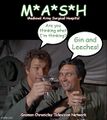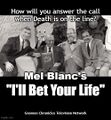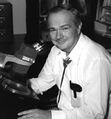April 26: Difference between revisions
No edit summary |
No edit summary |
||
| (One intermediate revision by the same user not shown) | |||
| Line 1: | Line 1: | ||
{{Daily Image/April 26}} | {{Daily Image/April 26}}{{Preface/April 26}} | ||
== Better Than News == | == Better Than News == | ||
{{Better Than News/April 26}} | {{Better Than News/April 26}} | ||
== Beyond Plausible == | |||
{{Beyond Plausible/April 26}} | |||
== In Other Words == | |||
{{In Other Words/April 26}} | |||
== Are You Sure == | == Are You Sure == | ||
| Line 9: | Line 17: | ||
{{Are You Sure/April 26}} | {{Are You Sure/April 26}} | ||
== | == Selected Anniversaries == | ||
{{Selected anniversaries/April | {{Template:Selected anniversaries/April 28}} | ||
== Topic of the Day == | == Topic of the Day == | ||
{{Daily Favorites/April 26}} | {{Daily Favorites/April 26}} | ||
{{Template:Categories: April 26}} | |||
Latest revision as of 10:33, 1 May 2024
Better Than News
Sweeney Vince is a 2007 American revisionist biography musical thriller film loosely based on the life of Vincent van Gogh.
M*A*S*H (an acronym for Medieval Army Surgical Hospital) is a war comedy drama television which follows a team of doctors and support staff stationed at various times and places in Medieval Europe.
Mel Blanc's I'll Bet Your Life is an American comedy reality television survival series hosted by Mel Blanc.
Ocean's 1 is a 1960 American heist film about World War II veteran Danny Ocean (Frank Sinatra), who simultaneously robs five Las Vegas casinos: the Sahara, the Riviera, the Desert Inn, the Sands, and the Flamingo.
Beyond Plausible
In Other Words
Tarzan: Lord of the Apiary is a 1984 adventure film loosely based on the beekeeping instructional manual of the same name by Edgar Rice Burroughs.
Love Tussle is a cologne for dogs.
Are You Sure
• ... that physicist Owen Willans Richardson won the Nobel Prize in Physics in 1928 for his work on thermionic emission, which led to Richardson's law, and that Richardson also researched the photoelectric effect, the gyromagnetic effect, the emission of electrons by chemical reactions, soft X-rays, and the spectrum of hydrogen?
• ... that the Chernobyl disaster began on Saturday 26 April 1986 with an uncontrolled nuclear chain reaction caused by a combination of unstable conditions and reactor design flaws; and that the chain reaction rapidly released of a large amount of energy which vaporized superheated cooling water, ruptured the reactor core in a highly destructive steam explosion, and ignited an open-air reactor core fire; and that airborne radiation contaminated parts of the USSR and western Europe?
• ... that the United States detonated the Castle Union nuclear test weapon on April 26, 1954 at Bikini atoll in the Marshall Islands, leaving a crater 910 meters in diameter and 27 meters deep; that sixty-seven nuclear weapons were detonated in the Marshalls over twelve years; and that just one of over sixty islands has been cleaned by the US government, and that the inhabitants of the Marshalls are still waiting for the two billion dollars in compensation assessed by the Nuclear Claims Tribunal, and that many of the islanders and their descendants still live in exile, as the islands remain contaminated with high levels of radiation?
• ... that physician Jean François Fernel (1497–1558) suggested that taste buds are sensitive to fat, an idea which research in the early 21st Century proved to be correct?
Selected Anniversaries
1693: Gottfried Wilhelm Leibniz writes to L'Hospital, announcing his discovery of determinants fifty years before Cramer, who was the real driving force in the development of determinants. Leibniz's work had little or no influence because it was not published until 1850 in his Mathematische Schriften.
1774: Astronomer Francis Baily born. He will observe "Baily's beads" during an annular eclipse (1836).
1817: Carl Friedrich Gauss writes to the astronomer H. W. M. Oblers, saying, "I am becoming more and more convinced that the necessity of our (Euclidean) geometry cannot be proved, at least not by human intellect nor for the human intellect."
1868: Mathematician Georgy Voronoy born. He will invent what are today called Voronoi diagrams or Voronoi tessellations.
1906: Mathematician, philosopher, and academic Kurt Gödel born. His two incompleteness theorems will have an immense impact upon scientific and philosophical thinking in the 20th century.
1928: Geologist and astronomer Eugene Merle Shoemaker born. Shoemaker will be the first scientist to conclude that Barringer Meteor Crater in Arizona, and similar craters, were caused by meteor impact.
1986: High levels of radiation resulting from the Chernobyl disaster are detected at a nuclear power plant in Sweden, leading Soviet authorities to publicly announce the accident.
1999: Physicist and engineer Rolf Landauer dies. Landauer discovered that in any logically irreversible operation that manipulates information, such as erasing a bit of memory, entropy increases and an associated amount of energy is dissipated as heat. This phenomenon is now known as Landauer's principle.
Topic of the Day
Philip K. Dick
The VALIS Show is a 1998 American psychological comedy-drama film about Philip K. Dick (Jim Carrey), a man who grew up living an ordinary life that—unbeknownst to him—takes place on a large set populated by actors for a covert operation against him.
1965: Publication of the political thriller novel The Three Stigmata of Karl Marx by American sociologist Philip K. Dick 1.1 about a future where humankind has implemented every possible economic system.

















